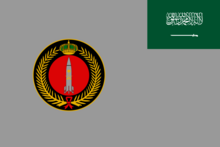Royal Saudi Strategic Missile Force
| Royal Saudi Strategic Missile Force | |
|---|---|

«Seal of the Royal Strategic Missile Forces»
|
|
| Founded | 8 September 1986; (30 years) |
| Country |
|
| Allegiance | Custodian of the Two Holy Mosques |
| Branch |
|
| Type | Land Based Intermediate-range ballistic missile forces |
| Role | Strategic Strike |
| Size | 40,000 full-time personnel (2015 est.) |
| Part of | |
| Garrison/HQ | 4 (or 5) bases |
| Equipment | Ballistic missiles |
| Commanders | |
|
|
Prince Mohammad Al Saud |
|
|
General Abdul Rahman Al Banyan |
|
|
Maj. General Jarallah Al Aluwayt |
| Insignia | |
|
|
 |
 |
|
The Royal Saudi Strategic Missile Force (Arabic: قوة الصواريخ الإستراتيجية الـملكية الـسعودية; RSSMF) is the fifth branch of the Royal Saudi Arabian Armed Forces, responsible for commissioning long-range strategic missiles. The RSSMF formerly had its headquarters in an underground command facility in Riyadh– the capital of Saudi Arabia.
The facility coordinated Saudi Arabia's advanced "Peace Shield" radar and air defense systems. In July 2013, the new RSSMF headquarters and academy buildings were officially opened by Prince Khalid bin Sultan bin Abdulaziz and current RSSMF commander Major General Jarallah Alaluwayt.
The RSSMF's role has grown rapidly since Saudi Arabia and other Arab States of the Persian Gulf announced in 2009 an initiative to obtain nuclear weapons as a countermeasure to the Iranian nuclear program. King Abdullah of Saudi Arabia and Prince Turki bin Faisal Al Saud, a former Saudi intelligence chief and ambassador to Washington, both mentioned the Persian Gulf states could acquire their own nuclear weapons as a countermeasure to Iran's.
Some experts speculate (by taking into account Saudi Arabia's financial contribution to Pakistan's nuclear weapons program) that Saudi Arabia may receive or has already received nuclear weapons from Pakistan. One report by the BBC claims "it is a cash-and-carry deal for warheads, the first of those options sketched out by the Saudis back in 2003; others that it is the second, an arrangement under which Pakistani nuclear forces could be deployed in the Kingdom."
...
Wikipedia
